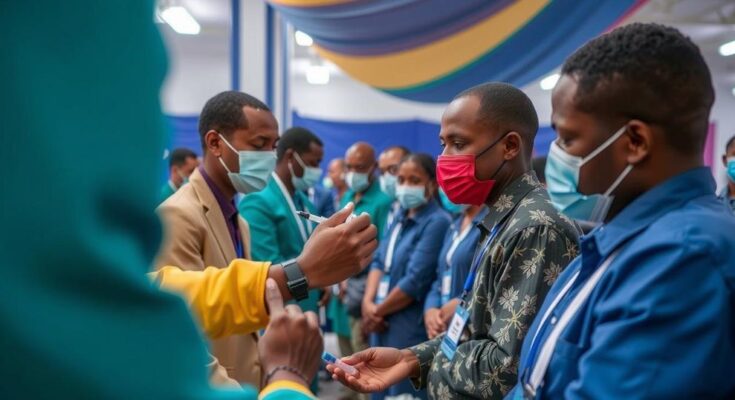Over 50,000 individuals in the Democratic Republic of Congo and Rwanda have received vaccinations against mpox, as reported by WHO’s Director-General. The epidemic remains uncontrolled with over 1,100 deaths across Africa. The African Union warns of a potential pandemic more severe than Covid-19, emphasizing the need for resources. Vaccination efforts are supported by donations from the United States and European Commission, with nearly 900,000 doses allocated to nine countries.
On Friday, the Director-General of the World Health Organization (WHO), Tedros Adhanom Ghebreyesus, announced that over 50,000 individuals have received vaccinations against mpox (previously referred to as monkeypox) in the Democratic Republic of Congo (DRC) and Rwanda. During a press conference, he elucidated that the mpox epidemic remains uncontrolled, with more than 1,100 fatalities recorded across Africa, primarily concentrated in the DRC, which serves as the outbreak’s epicenter. The African Union’s health agency has issued warnings regarding the potential for a “more severe” pandemic capable of surpassing the devastation caused by Covid-19, thereby underscoring the urgency of resource mobilization to combat this viral threat. In response, the DRC initiated a vaccination campaign last month, predominantly funded through generous contributions from the United States and the European Commission. Furthermore, Director-General Ghebreyesus revealed that nearly 900,000 vaccine doses have been distributed to nine countries as part of a collaborative effort involving the WHO and associated partners. This represents the initial distribution from a significant supply of nearly six million doses expected to be available by the conclusion of 2024, organized through the Access and Allocation Mechanism (AAM). He stated, “This is the first allocation of almost six million vaccine doses that we expect to be available by the end of 2024.” Mpox is a viral infection transmitted from infected animals to humans, with the potential for human-to-human transmission through intimate contact. Symptoms of the disease include fever, body aches, swollen lymph nodes, and the formation of a blistering rash reminiscent of smallpox. The ongoing efforts to vaccinate populations in the DRC and Rwanda are indicative of a proactive response to a concerning public health crisis, and continued vigilance is paramount to mitigating the impact of this emerging infectious disease.
Mpox, also known as monkeypox, is caused by a virus that can be transmitted to humans through close contact with infected animals or individuals. It was recently renamed to reduce stigma and enhance public health messaging. The outbreak is most pronounced in Africa, especially in areas such as the Democratic Republic of Congo, where the majority of cases and deaths have occurred. Since January, approximately 48,000 cases have been documented, leading to significant morbidity and fatalities. The African Union and WHO have recognized the potential severity of the mpox outbreak, prompting vaccination efforts supported by international funding and collaboration.
In summary, the vaccination campaign against mpox in the DRC and Rwanda is a critical step in addressing a growing public health threat that has already resulted in over 1,100 deaths across Africa. With substantial vaccine allocations sourced from international support, the WHO is striving to bolster preventive measures as part of a larger response to potentially escalating pandemics. Continued vaccination efforts and resource mobilization are essential to control the outbreak and protect public health in the affected regions.
Original Source: www.france24.com




